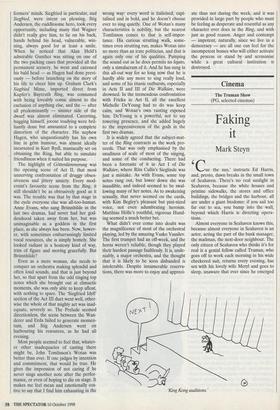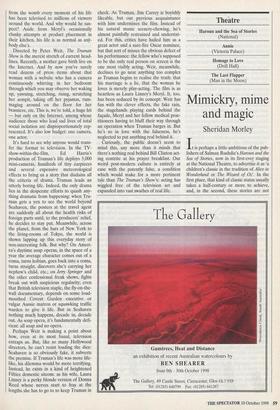Cinema
The Truman Show (PG, selected cinemas)
Faking it
Mark Steyn
Cue the sun,' instructs Ed Harris, and, presto, dawn breaks in the small town of Seahaven. There's no real sunlight in Seahaven, because the white houses and pristine sidewalks, the stores and office buildings, the bridges and the harbour, all are under a giant biodome: if you sail too far out to sea, you bump into the wall, beyond which Harris is directing opera- tions.
Almost everyone in Seahaven knows this, because almost everyone in Seahaven is an actor, acting the part of the bank manager, the mailman, the next-door neighbour. The only citizen of Seahaven who thinks it's for real is a genial fellow called Truman, who goes off to work each morning in his wide checkered suit, returns every evening, has sex with his lovely wife Meryl and goes to sleep, unaware that ever since he emerged 'King Kong auditions.' from the womb every moment of his life has been televised to millions of viewers around the world. And why would he sus- pect? Aside from Meryl's occasionally clunky attempts at product placement in their kitchen, his life is as normal as anY- body else's.
Directed by Peter Weir, The Truman Show is the merest stretch of current head- lines. Recently, a mother gave birth live on the Internet. And by now you've surely read dozens of press items about that woman with a website who has a camera continuously whirring in her bedroom through which you may observe her waking up, yawning, stretching, rising, scratching her armpit, taking off her pyjamas, rum- maging around on the floor for her brassiere, etc. This is, we're told, a huge hit — but only on the Internet, among whose audience those who lead sad lives of total social isolation are disproportionately rep- resented. It's also low budget: one camera, one actor.
. It's hard to see why anyone would trans- fer the format to television. In the TV- show-within-the-film, Ed Harris's production of Truman's life deploys 5,000 mini-cameras, hundreds of tiny earpieces and several expensive meteorological effects to bring us a story that disdains all the criteria of drama. Truman leads an utterly boring life. Indeed, the only drama lies in the desperate efforts to quash any- thing dramatic from happening: when Tru- man gets a yen to see the world beyond Seahaven, the posters at the travel agent are suddenly all about the health risks of foreign parts until, to the producers' relief, he decides to stay put. Meanwhile, across the planet, from the bars of New York to the living-rooms of Tokyo, the world is shown lapping up this everyday story of non-interesting folk. But why? On Ameri- ca's daytime soap operas, in the space of a year the average character comes out of a coma, turns lesbian, goes back into a coma, turns straight, discovers she's carrying her nephew's child, etc.; on Jerry Springer and the other confessional freak shows, fights break out with suspicious regularity; even that British television staple, the fly-on-the- wall documentary, depends on some loud- mouthed Covent Garden executive or vulgar Aussie matron or squawking traffic warden to give it life. But in Seahaven nothing much happens, decade in, decade out. As soap opera, it's fundamentally defi- cient: all soap and no opera.
Perhaps Weir is making a point about how, even at its most banal, television entraps us. But, like so many Hollywood directors, he can't resist loading the dice: Seahaven is so obviously fake, it subverts the premise. If Truman's life was more life- like, his dilemma would be more terrifying. Instead, he exists in a kind of heightened Fifties domestic sitcom: as his wife, Laura Linney is a perky blonde version of Donna Reed whose nerves start to fray at the lengths she has to go to to keep Truman in check. As Truman, Jim Carrey is boyishly likeable, but our previous acquaintance with him undermines the film. Instead of his natural manic scenery-chewing, he's almost painfully restrained and understat- ed. For this, critics have hailed him as a great actor and a sure-fire Oscar nominee, but that sort of misses the obvious defect of his performance: the fellow who's supposed to be the only real person on screen is the one most visibly acting. Weir, meanwhile, declines to go near anything too complex as Truman begins to realise the truth: that his marriage is a lie, that the woman he loves is merely play-acting. The film is as heartless as Laura Linney's Meryl. It, too, has been seduced by its concept: Weir has fun with the clever effects, the fake rain, the stagehands playing cards behind the facade, Meryl and her fellow medical prac- titioners having to bluff their way through an operation when Truman barges in. But he's so in love with the falseness, he's neglected to put anything real behind it.
Curiously, the public doesn't seem to mind this, any more than it minds that there's nothing real behind Bill Clinton act- ing contrite at his prayer breakfast. Our weird post-modern culture is entirely at ease with the patently false, a condition which would make for a more pertinent tale than The Truman's Show's: acting has wiggled free of the television set and expanded into vast swathes of real life.











































































 Previous page
Previous page